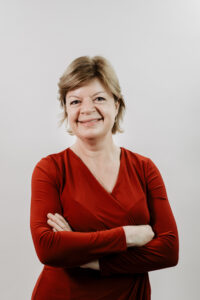Menu
Rachel Wicaksono
York St John University

Rachel Wicaksono is Professor of TESOL and Applied Linguistics, and Head of the School of Education, Language and Psychology at York St John University, UK. She has taught English, trained teachers, inspected programmes, and led courses and schools in: Indonesia, India, Sri Lanka, Pakistan, Vietnam, Malaysia, China, Japan, Thailand and Sweden.
In 2013, she was awarded a Higher Education Academy National Teaching Fellowship for her work on the internationalisation of Higher Education. She has been a member of the British Association for Applied Linguistics Executive Committee since 2017 and is currently Membership Secretary.
Talk Information:
Ontologies of English: in applied linguistics, TESOL and beyond
May 26, 2023 | 9:00 AM
The question of what named languages, such as English, ‘are’ has been explicitly addressed by scholars working in a variety of paradigms, from World Englishes and English as a lingua franca, to translanguaging and post-humanist applied linguistics.
In the first part of this talk, I start by outlining a framework that is designed to map this variety of ontological commitments to English/language (Hall and Wicaksono, 2020). Given that our discipline is broadly premised on problem-solving (Hall et al, 2017), I consider how applied linguists, and the language learners and users they work with, might benefit from mapping their ontologies of English.
In the second part of the talk I briefly present four case studies in which the consideration of what things ‘are’ played a part: ‘Changing Englishes’, an English language teacher development web-based resource (Hall and Wicaksono, 2020); ‘York’s Hidden Stories’, a project on the meaning and use of interviews in applied linguistics (Wicaksono and Zhurauskaya, 2020); a duo-ethnographic study to explore the decolonising of research and practice in Psychotherapy (Charura and Wicaksono, 2023); and a collaboration with a museum conservator to develop a way of thinking about what the objects in our care ‘are’, prior to treatment (Read and Wicaksono, 2023). I reflect on the benefits and drawbacks of the ontological focus of these projects, in terms of the further development of the framework outlined in the first part and the potential to fulfil the promise of applied linguistics to solve problems.
Finally, I consider where, working in trans-disciplinary collaboration, this work might go next.
References
Charura, D. and Wicaksono, R. (2023). Doing Arts-based Decolonising Research, in (eds) S. Bager-Charleson and A. McBeath, Supporting Research in Counselling and Psychotherapy: Qualitative, Quantitative and Mixed Methods Research. Cham, Switzerland: Palgrave Macmillan.
Hall, C. J., Smith. P. H. and Wicaksono, R. (2017). Mapping applied linguistics: An introduction for students and practitioners. Second edition. London and New York: Routledge.
Hall, C. J. and Wicaksono, R. (2020). Changing Englishes: An online course for teachers (v.02.2). Online. Available at: www.changingenglishes.online
Hall, C. J. and Wicaksono, R. (eds) (2020). Ontologies of English: Conceptualising the language for learning, teaching and assessment. Cambridge: Cambridge University Press.
Read, M. and Wicaksono, R. (2023). Modelling a cam track for the Silver Swan automaton at Bowes Museum: A cross-disciplinary reflection on ‘what things are’, Journal of the Institute of Conservation.
Wicaksono, R. and Zhurauskaya, D. (2020). York’s hidden stories: Interviews in applied linguistics. London: Palgrave Macmillan. Companion website: www.yorkshiddenstories.org
Play Video